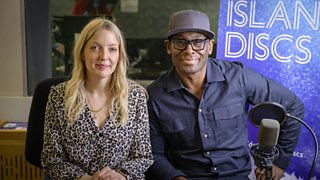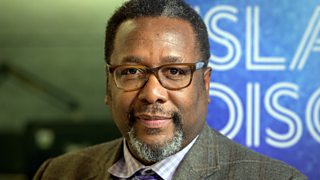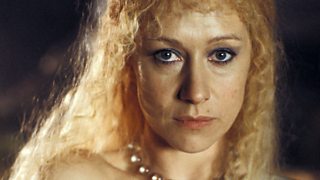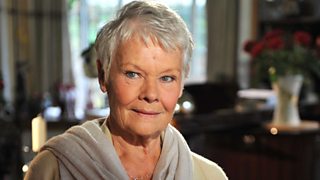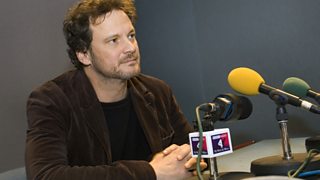Seven things we learned from David Harewood's Desert Island Discs
Warning: This article references strong and racist language.
David Harewood was born in Birmingham in 1965, the son of a couple who had moved to England from Barbados. As an actor he found international fame via roles in the US television series ���˿���land and Supergirl. In 1997 he was the first black actor to play Othello at the National Theatre in London, and he toured the world as Antony opposite Vanessa Redgrave’s Cleopatra. He has also talked openly about the mental illness he experienced as a young man, which was at the heart of his acclaimed TV documentary Psychosis and Me.
Here’s what we learned from his Desert Island Discs...
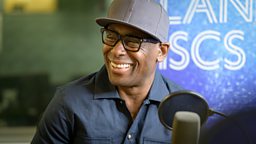
1. Life on and off stage are very different – and the on-stage world has lots of advantages
“You have surety on stage. You have certainty,” says David. “We've all rehearsed the moves, everyone knows their lines, everyone is wearing their costumes, everything is set and that's not like life, is it?”
My brothers, we’re all playing around, and my sister came running and she said, ‘Roger, Paul, David! There's a black man on the television!’
“No one knows their lines in life, in real life. On stage I sort of grow - you give me a character, I pour myself into that character and it gives me a sense of freedom."
2. David loved long childhood road trips with his dad
David’s father Romeo was a delivery driver who did the Bread Run – the drive from the Midlands down to Devon to deliver bread. “He was a quiet man, a very, very quiet man,” says David.
“As a kid I just remember sitting in front of his truck, high up, in his truck looking out the window, watching the fields and the different towns roll by. It was great. As a kid I had a wonderful imagination, so there were always ideas flying around in my head about fighter jets zooming in to kind of pick me up from the lorry ."
“The Thunderbirds would launch and pick my dad’s trailer up – all these great James Bond type images of Bond shooting out of the back of the trailer and driving off in a fancy car and stuff.”
And one of his desert island music choices evokes his childhood home:
“[My parents] had this gramophone, and all their records in it, and sometimes we'd sneak into that front room and play some of their music. And this was one of those tracks and it's really evocative of family and time, something that's gone.”
The track is Johnny Nash singing Tears on My Pillow.
3. As a seven year old, he experienced a shocking encounter with a stranger
“I saw this old guy across the street and he kind of was walking towards me,” remembers David, “but it wasn’t like he was a skinhead – back in the day if you saw a skinhead you knew you were in trouble... you’d go ‘I’d better run here’, or ‘I better scarper’. So this guy was no threat to me."
“And he walked up to me in a very calm way. And then he kind of leaned in, and he said: ‘Get the **** out of my country, you little black **.’”
“And he stayed there looking at me, glaring at me with his big red face.”
"And it really, suddenly hit me that because I was black that he didn't think I belonged here. I just always remember that being really discombobulating, really confusing. As a young kid I just didn't understand it. I thought, ‘I'm from England’.”
4. He has a sharp childhood memory of an unexpected moment on TV
“One day we were all playing in the playground. My brothers, we’re all playing around, and my sister came running and she said, ‘Roger, Paul, David! There's a black man on the television!’”
“We all ran into the living room to see! It would be Sinbad, or something like that, or some American film and there'd be the one strong, heroic black dude who'd sort of fight the Cyclops, and save the day, and die heroically. They wouldn't last, but it was good to see them, I guess seeing myself – [and made me think] ‘Yes, there is a way. It might be difficult, but there is a way of making it.’”
5. One of his discs captures the uncertainty he felt when he was about to leave school
“This sound and this band very much reflected the multicultural nature of my world,” reflects David. “And I remember it being a very pivotal moment in my life thinking: ‘What am I going to do with my life?’”
"I didn’t thrill academically at school, I didn’t really want to go to university. It was like the dole office or the factory for me, it was about being a number on a list, just a sense of hopelessness in the early eighties, of not having a future."
The band is UB40, from Birmingham, and the song is One in Ten, released in 1981, with the title referring to the number of people claiming unemployment benefit in the West Midlands at that time.
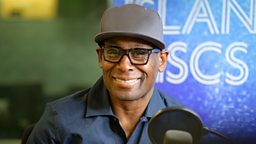
6. One of his secondary school teachers transformed his life
David had earned a reputation for messing around at school, but also as someone who had the ability to make his classmates (and against their better judgement, the teachers) laugh at his antics.
"Five weeks away from leaving school, I got this call from one of my teachers, Mr Reader. And he called me in and said, ‘What are you going to do when you leave here?’”
“And I really had no idea. So I said, ‘I don’t know, sir.’ And Mr Reader said, ‘Well, look, we've been talking in the staff room, and we think you should be an actor.’”
“And that was my Eureka moment. I hadn't even thought it was possible to be an actor. I didn't even know what an actor was or how you become an actor.”
“But a fire was lit in me. I just suddenly went ‘Ah, what a great idea!’”
7. One of his discs was his karaoke choice – and still brings back powerful memories
“I had a very, very good friend of mine when I was at school,” explains David. “Louis, Italian guy, he always said to me you're going to make it. He was the only one who was convinced that I was going to make it.”
Louis and David used to travel to Italy together every year. One year there was a karaoke contest in the camp they were staying in and Louis told David he had to enter and sing that night.
“I got up and I sang... and people were sobbing. So the next night they said. ‘You, let's go’, and I had to sing it every single night, every single night we were in the camp and I always remember it because Louis, unfortunately he passed away.”
Years later, down to his last £80 David found out he’d got the role of CIA counterterrorism director David Estes in ���˿���land.
“I said to my wife, my God, I've got the job, and she said, ‘You know what day it is today? It's Louis’s birthday.’”
“I got the job a year after he died. On his birthday and I thought, ‘You always said I was going to make it,’ and he was right. But this song always reminds me of him.”
The song is Otis Redding’s (Sittin' On) The Dock of the Bay.

More Desert Island Discs
-
![]()
Wendell Pierce
The actor shares his castaway musical choices.
-
![]()
The academy award-winning actress spoke to Roy Plomley in 1982.
-
![]()
The Oscar-winning actress was Kirsty Young's castaway in 2015.
-
![]()
The multii-award-winning actor was interviewed by Sue Lawley in 2005.
